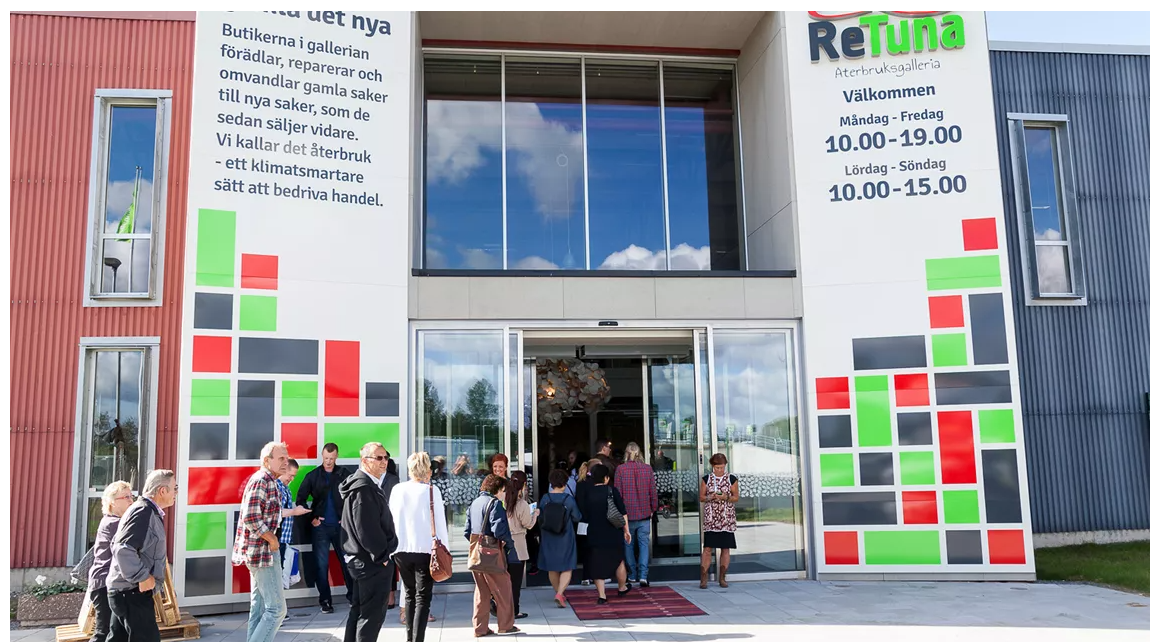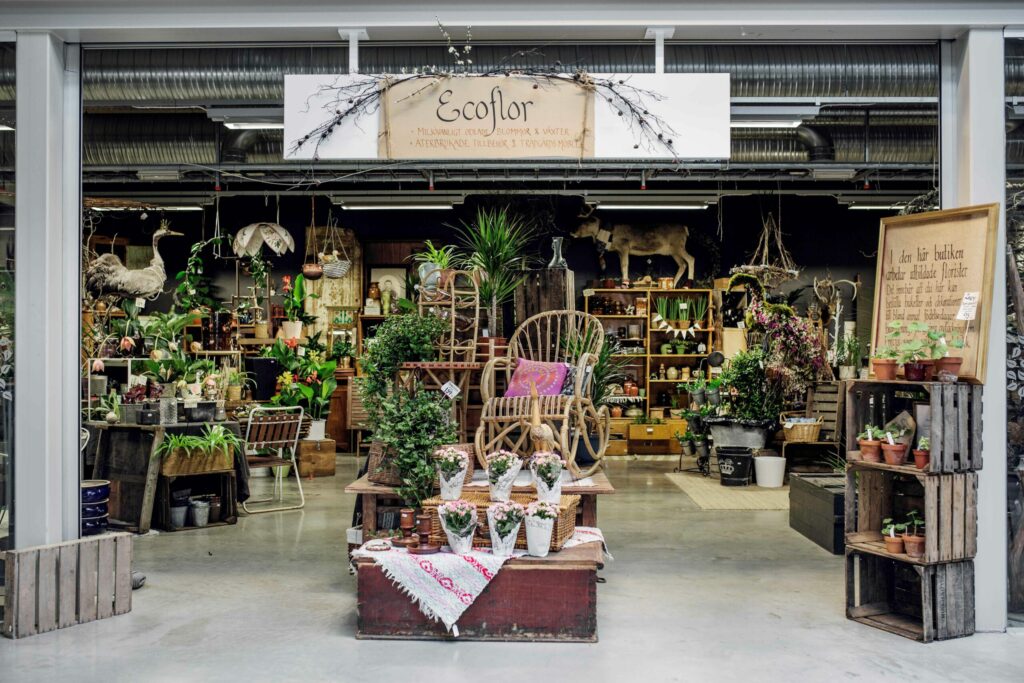ReTuna – The world’s first recycling mall


ReTuna Återbruksgalleria is the world’s first recycling mall, revolutionising shopping in a climate-smart way. Old items are given new life through repair and upcycling. Everything sold is recycled or reused, or has been organically or sustainably produced.
The mall opened its doors in August 2015 and is located next to the Retuna Återvinningscentral recycling center at Folkestaleden 7 in Eskilstuna. It is easy for visitors to sort materials they are discarding into the containers and then drop off reusable toys, furniture, clothes, decorative items, and electronic devices in the mall’s depot, called “Returen”. In the depot, staff from AMA (Eskilstuna Municipality’s resource unit for activity, motivation and work) perform an initial culling of what is usable and what is not. The items are then distributed to the recycling shops in the mall. The shop staff then perform a second culling, where they choose what they want to repair, fix up, convert, refine – and ultimately sell. In this way, the materials are given new life.
And the business concept is working: In 2018, ReTuna Återbruksgalleria had SEK 11.7 million in sales for recycled products.
- More Info
- Gallery
- Video
- Interview
- Contact
Challenge
The large goal of the recycling park (Återvinningscentralen and Återbruksgallerian) is to reduce waste in the municipality. In that goal, ReTuna will be an arena for various businesses to explore sustainable and climate-smart business ideas, and to be a platform for circular trade and a sharing economy
Target group
Entrepreneurs, consumers, businesses and individuals.
Solution
The mall was inaugurated in August 2015 and is located next to the Retuna Recycling Center at Folkestaleden 7 in Eskilstuna. It is easy for visitors to sort materials in the containers and then take the opportunity to leave reusable toys, furniture, clothes, interior items and technology in the mall’s “Return” depot. Here the material is received personally from AMA (Eskilstuna municipality’s resource unit for Activity, Motivation and Work) who makes an initial thinning. The items are then distributed to the recycling shops in the mall. The shop staff does a second thinning and selects what they want to repair, fix, transform, refine – and sell. That way, the material still comes to life.
Innovation
They are a circular economy for real, that is easy to understand, and to practice.
Unique Selling Point
ReTuna is more than a trading platform. The assignment is also to be a public educator. Events, workshops, lectures, theme days are organized here – all with a focus on sustainability. Eskilstuna Folkhögskola conducts its one-year education “Recycle Design – Återbruk” in the premises. There are also conference rooms here where guests can have climate-smart meetings. Café Returama offers organic lunch and coffee.
Impact
The business idea works: in 2020, recycled products worth 15.4 million were sold at ReTuna Återbruksgalleria. An increase of almost 92% from the start.
Feasibility / Transferability
The Retuna approach has the potential to be transferred to other locations that have similar economic and cultural conditions.


 11 - Sustainable Cities & Communities
11 - Sustainable Cities & Communities
As epicentres of the COVID-19 crisis, many cities have suffered from insufficiencies in public health systems, inadequate basic services, a lack of well-developed and integrated public transport systems and inadequate open public spaces, as well as from the economic consequences of lockdowns. As a result, the pandemic is likely to further increase the number of slum dwellers. In order to improve the lives of over 1 billion slum dwellers, there is an urgent need to focus on policies for improving health, affordable housing, basic services, sustainable mobility and connectivity.
Over the years, the number of slum dwellers has continued to grow and that number was over 1 billion in 2020. Slum dwellers are most prevalent in three regions, which are home to about 85 per cent of the world’s slum residents: Central and Southern Asia (359 million), Eastern and South-Eastern Asia (306 million) and sub-Saharan Africa (230 million).
Data for 2020 from 1,510 cities around the world indicate that on average only about 37 per cent of their urban areas are served by public transport, measured as a walking distance of 500 m to low-capacity transport systems (such as buses and trams) and/or 1,000 m to high-capacity systems (such as trains and ferries). Given variations in population concentrations within those cities, this translates into only about 52 per cent of the world population having convenient access to public transport.
In 2022, the global average municipal solid waste collection rate in cities is at 82 per cent and the global average rate of municipal solid waste management in controlled facilities in cities is at 55 per cent. The municipal solid waste collection rates in sub-Saharan Africa and Oceania are less than 60 per cent. Uncollected waste is the source of plastic pollution, greenhouse gas emissions and incubation for infections.
Data for 2020 from 1,072 cities point to a poor distribution of open public spaces in most regions. In these cities, only about 38 per cent of urban areas are loca ted within a walking distance of 400 m to an open public space, which translates into only about 45 per cent of the global urban population having convenient access to those spaces.
By March 2021, a total of 156 countries had developed national urban policies, with almost half (74) already in the implementation stage. A further breakdown shows that 40 per cent of the countries are in the early stages of developing their plans, while 12 per cent are monitoring and evaluating how well those plans are functioning.
By the end of 2021, a total of 98 countries had reported having local governments with disaster risk reduction strategies, an increase from 51 countries in 2015.

 12 - Responsible Consumption & Production
12 - Responsible Consumption & Production
Developing countries bear a large part of the climate, biodiversity and pollution impacts of resource-intensive production processes, without reaping their benefits. This situation has been made worse by the impacts of the pandemic. As part of sustainable global pandemic recovery strategies, the implementation of sustainable consumption and production will maximize the socioeconomic benefits of resource use while minimizing the impacts.
In 2021, 83 policy instruments supporting the shift to sustainable consumption and production were reported by 26 countries, bringing the total number of policies developed, adopted and/or implemented up to 438 (as reported by 59 countries and the European Union for 2019–2021). However, the distribution of reported sustainable consumption and production policies has so far been uneven, with 79 per cent of policies reported by high-income and upper middle income countries, 0.5 per cent by low-income countries and only 7.7 per cent by least developed countries, landlocked developing countries and small island developing States.
The global material footprint continues to grow, although the pace has slowed. The average annual growth rate of the global material footprint for 2015–2019 was 1.1 per cent, compared with 2.8 per cent for 2000–2014, indicating a slowdown in the growth of economic pressure on the environment.
The proportion of food lost globally after harvest on farm, transport, storage, wholesale and processing levels is estimated at 13.3 per cent in 2020, with no visible trend since 2016, suggesting that structural patterns of food losses have not changed. At the regional level, sub-Saharan Africa has the highest proportion of losses at 21.4 per cent, with food being lost in large quantities between the farm and retail levels.
In addition to food loss, it is estimated that 931 million tons of food, or 17 per cent of total food available to consumers in 2019, was wasted at the household, food service and retail levels. Subsequent evidence suggests that household food waste declined during the COVID-19 pandemic lockdowns but has since returned to pre-pandemic levels.
The COVID-19 pandemic aggravated the global pollution crisis, in particular plastics pollution, making the effective implementation of the Basel Convention on the Control of Transboundary Movements of Hazardous Wastes and Their Disposal, the Rotterdam Convention on the Prior Informed Consent Procedure for Certain Hazardous Chemicals and Pesticides in International Trade and the Stockholm Convention on Persistent Organic Pollutants so much more urgent and important. The year 2021 was marked by the establishment of a new global regime for controlling trade of plastic wastes for better transparency and tracing, following the adoption of the plastic waste amendments to the Basel Convention in 2019.
A preliminary analysis from a sample of over 10,000 public companies around the world shows that over 60 per cent of large companies published sustainability reports in 2021, a twofold increase from 2016. The sustainability indicators that are most widely disclosed by companies include direct CO2 emissions, board diversity E/2022/55 22-06472 19/25 and number of board meetings, while the least disclosed indicators include ozone depleting substances, gender pay gap and bribery and fraud controversies.
